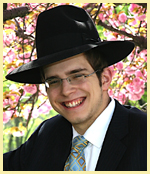Parshas Shemos 5782
When Things Look Bleak
[Editor’s note: As a memory of my beloved brother Shaya, I would like to continue sending out his pearls of wisdom that he has shared with all of you in the past. For some of you this may ring a bell and for others it may appear to be totally new. May the learning of Shaya’s Divrei Torah inspire us to change our ways and thereby give an Aliya to the neshama of our dear beloved Shaya whom we miss so much. A special thank you to Aaron Friedman for always looking over the divrei torah.]
There is an enigmatic Gemara in Sotah which discusses a Pasuk in this week’s Parsha, Parshas Shemos. In the Torah’s description of Miriam placing Moshe Rabbeinu in the basket in the Nile River, the Pasuk says “ותתצב אחתו מרחק לדעה מה יעשה לו -and his sister stood at a distance to know what would be done to him.”
Rav Yitzchak comments that this whole Pasuk is a reference to Hashem’s Shechina. For every word in the Pasuk, Rav Yitzchak brings another Pasuk that uses that same word in reference to Hashem.
When I first learned this Gemara a number of years ago, I thought to myself “Cute Gemara. Each word in the Pasuk is the same word used in reference to Hashem elsewhere in Tanach.” And I thought nothing more of it. However, after my mind was opened up to the depth and beauty of Torah and I came back to this Gemara, I pondered why specifically on this Pasuk is Rav Yitzchak telling us that all the words are related to Hashem? And what is Rav Yitzchak teaching us?
Let us backtrack for a moment to understand the story leading up to this Pasuk. Miriam had a prophecy that her mother would give birth to the leader and savior of the Jewish People. When Moshe was born, the entire house lit up with a special light and Miriam’s father, Amram, told her that her prophecy had been fulfilled. Everything looked wonderful. But then ‘trouble’ struck.
After three months of concealing Moshe from the Egyptian authorities, Amram and Yocheved were no longer able to hide Moshe, as the Egyptians were searching for all babies. Moshe was placed in the river. A three month old baby, in the Nile River and amongst crocodiles!
According to some commentators, Moshe’s mother had despaired of his life. His father, Amram, gave Miriam a clap on the cheek and said ‘what happened to your prophecy?’ It seemed that even Amram, the Gadol Hador, was bewildered and confused! Everything looked so dark and dismal.
This is precisely where Rav Yitzchak’s explanation comes into the context of our Pasuk. Rav Yitzchak explains that this whole story is about the Shechina. “Shechina” refers to Hashem’s Divine Providence and supervision of this world. Rav Yitzchak is telling us that although it may look dark and frightful as though G-d isn’t there, in reality, not only is he there, but everything that you think is so bad is really just the opposite.
This is similar to the Purim story, where everything looked dark and bleak. Haman built the gallows to hang Mordechai. But then there was a total reversal, and Haman was hung on the very gallows that he himself constructed!
I believe the same dynamic is taking place in our story. It looked so dark and bleak that Moshe was going to drown in the river, but in reality, just the opposite was taking place. This act of being put in the river saved Moshe’s life and allowed him to be the leader and savior of the Jewish people! How so? The Gemara tells us after Moshe was placed into the water, the astrologers of Pharaoh- who had predicted that there was going to be a Jewish boy that would redeem the Jewish people- told Pharaoh that they no longer see any threat from the Jewish leader. [They had foreseen Moshe would have some issue with water, which is why they wanted to drown him, and once he was put in the water they thought he was neutralized.] Pharaoh then abolished the decree of killing all the babies. Hence, Moshe being put into the river not only did not kill or injure him, but in fact saved his life and many others as well!
This is what Rav Yitzchak is telling us about the story. It may look so dark and bleak, but in reality, just the opposite is taking place. Hashem’s divine providence is orchestrating the entire story!
In life, we all endure troubling times where it is very difficult to see Hashem’s Hashgacha. Let us all take this lesson to heart, to firmly believe and acknowledge that although it feels so painful and doesn’t seem to make any sense, Hashem is always there and everything that is happening is for our benefit. |





